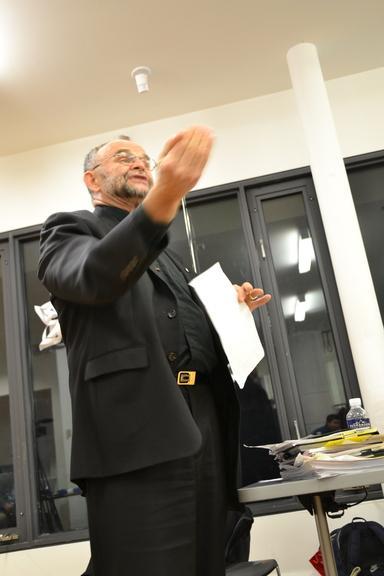The announcement of big deficits. The resignation of its executive director. An acrimonious GM.
It’s been a long week for the folks at Pride Toronto (PT). So what’s next?
The Community Advisory Panel (CAP) will present its recommendations to the Pride Toronto (PT) board of directors on Feb 8, and it is widely expected to precipitate big changes at PT.
Pride Coalition for Free Speech (PCFS) member Ashleigh Ingle says the group has watched the CAP consultation process closely and hears a clear, resounding message from the gay, lesbian, bi and trans communities.
“What we saw at the public consultations was pretty unambiguous,” she says. “We heard, ‘Get your house in order and don’t isolate the community.’”
On Jan 22, the PCFS met to talk about about the CAP process in advance of PT’s Jan 27 general meeting.
“A fundamental message for us is the board must not be willing to sell out our community,” says Ingle. “The saddest part for us last year, last Pride, is we really saw the board of directors abandon what we see to be the roots of Pride. They chose to side with corporate and government sponsors over the community.”
CAP, comprising nine people and chaired by Metropolitan Community Church of Toronto pastor Brent Hawkes, is billed as an “independent panel,” unelected but charged with consulting with the community on the future of the festival and reporting back to PT.
The panel held five general public meetings in December. It also held about 30 private targeted consultations, collected about 1,600 surveys and scrolled through pages of Facebook messages. The CAP report and recommendations will be presented at a public meeting on or about Feb 14.
At the meetings, a handful of attendees suggested PT consider hosting two Pride parades as a way to satisfy the division between those who want a broadly inclusive parade and those who want to limit the attendance of controversial groups. But many of the attendees laughed off that suggestion. At the Gladstone Hotel on Dec 4, PT board member and PCFS member Roy Mitchell joked that there should perhaps be “six parades, one for every colour of the rainbow flag.”
Ingle says a CAP recommendation for two or more Pride organizations would not reflect what CAP heard during the consultation process.
“PCFS feels recommending PT host two Prides would be an abject failure on the part of CAP,” she says. “There can be a number of different events hosted by a number of different people at Pride, but that’s very different from a call to move political messages out of the main parade. If that is part of CAP, we see that as censorship.”
PCFS’s Kim Koyama adds that PT should always be prepared to defend free expression.
On Jan 21, Hawkes told Xtra the PT board will hear CAP’s recommendations before they are released to the public. Ingle says this is a bad decision.
“I think it’s very important PT and the community receive this report at the same time,” she says.
“Giving the board a chance to make changes is clearly a problem. If they are there to represent the community, I don’t see why we all shouldn’t get the report at the same time.”
*
THREE COMMON THREADS FROM THE COMMUNITY ADVISORY PANEL’S PUBLIC MEETINGS:
The Corporatization of Pride
CAP heard over and over again that PT management ought to fight against city hall and corporations and not against the gay community.
At the trans panel on Dec 9, Savannah Garmon echoed the sentiment.
“We all oppose the ‘bigger is better’ mentality. That’s diluting the message of Pride.”
So, if it comes down to a choice between funding with strings attached, PCFS says the board should take a pass on the cash.
“Pride can not let corporate sponsors dictate who can participate and who can’t,” says Koyama. “Funding can’t be contingent on certain conditions.”
Structure and governance
Participants expressed worry about the financial situation at PT. Organizers need to bring PT to a place where its financials are in order and decisions are made in full view of the public and the roots of Pride remain intact, says Ingle. Going forward, the organization should be managed by those who value the interests of the entire community.
To do this, Ingle says PT needs to overhaul its entire structure. She hopes to hear a recommendation that will lead the board to a place where they will never again need a CAP-like body.
Accountability
At the racialized forum on Dec 14, Akim Adé Larcher of the Black, Trans, Lesbian and Gay Coalition, said the source of PT’s problems is the highest levels of its leadership.
“If we want to fix anything, they have to accept that they need to resign,” said Larcher. “They have to understand that they have sufficiently damaged this community. They have to resign because it’s the right thing to do.”
The CAP recommendations should be followed by an election for a new board, Ingle says.
“If anyone feels they are unjustly kicked off, they can make that argument and go through a reelection process.”

 Why you can trust Xtra
Why you can trust Xtra


